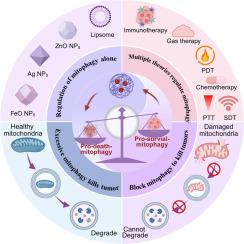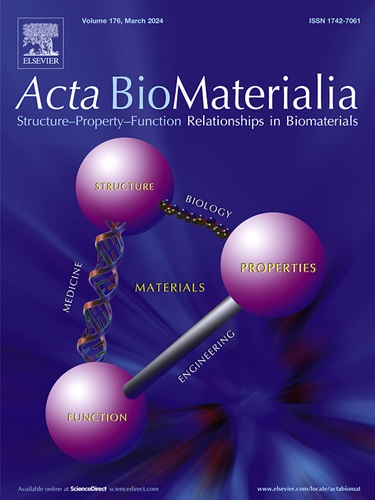纳米技术靶向肿瘤治疗中线粒体自噬的调节:进展和挑战。
IF 9.6
1区 医学
Q1 ENGINEERING, BIOMEDICAL
引用次数: 0
摘要
目前癌症治疗的临床疗效仍然不足,迫切需要确定新的治疗靶点,并将其与传统治疗方法相结合。线粒体自噬是细胞内清除受损线粒体的重要机制,在癌症治疗中显示出巨大的潜力。然而,准确有效地调节线粒体自噬仍然是一个重大挑战。近年来,基于纳米颗粒的药物传递系统因其高靶向能力和深入组织渗透而引起了广泛的关注。因此,应用纳米技术调控线粒体自噬可能为癌症治疗提供新的治疗策略。本文综述了利用纳米技术靶向调节线粒体自噬的最新进展,包括单独使用纳米颗粒载体或与其他癌症治疗方法联合使用。此外,我们还讨论了线粒体自噬的发展、相关信号通路、线粒体自噬与癌症的关系、调节线粒体自噬的药物以及检测线粒体自噬的方法。最后,我们探讨了利用纳米技术靶向和调节线粒体自噬在癌症治疗中的前景和挑战。意义声明:本综述强调了线粒体自噬在癌症中的治疗相关性,重点关注其在线粒体质量控制和肿瘤调节中的选择性作用。鉴于在精确的线粒体自噬调节方面的挑战,我们强调了基于纳米技术的递送系统作为一个有前途的解决方案的出现。综述涵盖了线粒体自噬机制、相关途径、检测技术、线粒体自噬调节剂和纳米颗粒策略,包括独立和组合。它进一步讨论了转化机会和技术障碍,为纳米医学如何实现靶向有丝分裂干预以改善癌症治疗提供了一个简明、综合的视角。本文章由计算机程序翻译,如有差异,请以英文原文为准。

Nanotechnology-targeted modulation of mitophagy in cancer therapy: Progress and challenges
The clinical efficacy of current cancer treatments remains insufficient, creating an urgent need to identify new therapeutic targets and combine them with traditional treatment methods. Mitophagy, a crucial mechanism for the intracellular clearance of damaged mitochondria, has shown tremendous potential in cancer therapy. However, accurately and effectively regulating mitophagy remains a significant challenge. In some years, nanoparticle-based drug delivery systems have attracted considerable attention due to their high targeting ability and deep tissue penetration. Therefore, applying nanotechnology to regulate mitophagy may offer new therapeutic strategies for cancer treatment. This review provides a comprehensive overview of the recent advances in the targeted regulation of mitophagy using nanotechnology, including the use of nanoparticle carriers alone or in combination with other cancer therapies. Additionally, we discuss the development of mitophagy, the relevant signaling pathways, the relationship between mitophagy and cancer, drugs that modulate mitophagy, and methods for detecting mitophagy. Finally, we explore the prospects and challenges of using nanotechnology to target and regulate mitophagy in cancer therapy.
Statement of significance
This review underscores the therapeutic relevance of mitophagy in cancer, focusing on its selective role in mitochondrial quality control and tumor regulation. Given the challenges in precise mitophagy modulation, we highlight the emergence of nanotechnology based delivery systems as a promising solution. The review covers mitophagy mechanisms, associated pathways, detection techniques, mitophagy modu lating agents, and nanoparticle strategies— both standalone and combinatorial. It further discusses translational opportunities and technical barriers, offering a concise, integrative perspective on how nanomedicine can enable targeted mitophagy interventio n for improved cancer therapy.
求助全文
通过发布文献求助,成功后即可免费获取论文全文。
去求助
来源期刊

Acta Biomaterialia
工程技术-材料科学:生物材料
CiteScore
16.80
自引率
3.10%
发文量
776
审稿时长
30 days
期刊介绍:
Acta Biomaterialia is a monthly peer-reviewed scientific journal published by Elsevier. The journal was established in January 2005. The editor-in-chief is W.R. Wagner (University of Pittsburgh). The journal covers research in biomaterials science, including the interrelationship of biomaterial structure and function from macroscale to nanoscale. Topical coverage includes biomedical and biocompatible materials.
 求助内容:
求助内容: 应助结果提醒方式:
应助结果提醒方式:


